Search the Special Collections and Archives Portal
Search Results
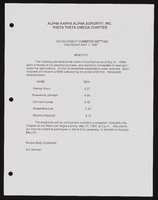
Alpha Kappa Alpha Sorority, Theta Theta Omega Chapter scholarship committee report
Date
Archival Collection
Description
From the Alpha Kappa Alpha Sorority, Incorporated, Theta Theta Omega Chapter Records (MS-01014) -- Chapter records file.
Text
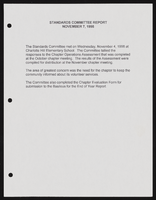
Alpha Kappa Alpha Sorority, Theta Theta Omega Chapter standards committee report
Date
Archival Collection
Description
From the Alpha Kappa Alpha Sorority, Incorporated, Theta Theta Omega Chapter Records (MS-01014) -- Chapter records file.
Text
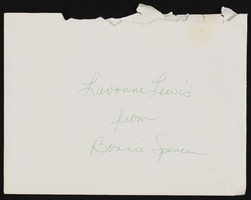
Alpha Kappa Alpha Sorority, Theta Theta Omega Chapter Labor Day bash fundraiser ephemera
Date
Archival Collection
Description
From the Alpha Kappa Alpha Sorority, Incorporated, Theta Theta Omega Chapter Records (MS-01014) -- Chapter records file.
Text
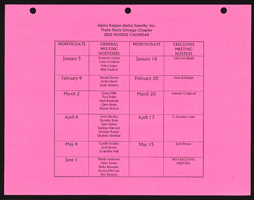
Alpha Kappa Alpha Sorority, Theta Theta Omega Chapter hostess calendar
Date
Archival Collection
Description
From the Alpha Kappa Alpha Sorority, Incorporated, Theta Theta Omega Chapter Records (MS-01014) -- Chapter records file.
Text
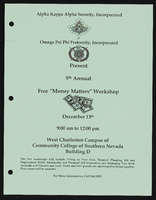
"Money Matters" workshop flier
Date
Archival Collection
Description
From the Alpha Kappa Alpha Sorority, Incorporated, Theta Theta Omega Chapter Records (MS-01014) -- Chapter records file. Presented by Alpha Kapp Alpha Sorority and Omega Psi Phi Fraternity.
Text
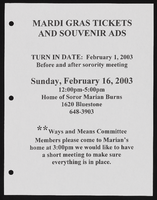
Alpha Kappa Alpha Sorority, Theta Theta Omega Chapter Mardi Gras flier
Date
Archival Collection
Description
From the Alpha Kappa Alpha Sorority, Incorporated, Theta Theta Omega Chapter Records (MS-01014) -- Chapter records file.
Text
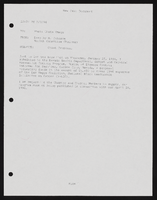
Alpha Kappa Alpha Sorority, Theta Theta Omega Chapter health committee report
Date
Archival Collection
Description
From the Alpha Kappa Alpha Sorority, Incorporated, Theta Theta Omega Chapter Records (MS-01014) -- Chapter records file.
Text
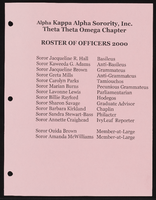
Alpha Kappa Alpha Sorority, Theta Theta Omega Chapter roster of officers
Date
Archival Collection
Description
From the Alpha Kappa Alpha Sorority, Incorporated, Theta Theta Omega Chapter Records (MS-01014) -- Chapter records file.
Text
Audio recording clip of interview with Rev. Marion D. Bennett, Sr. by Claytee D. White, January 12, 2004
Date
Archival Collection
Description
Part of an interview with Rev. Marion D. Bennett, Sr. conducted by Claytee D. White on January 12, 2004. Bennett recalls working with Los Angeles labor organizer Jim Anderson to form the Nevada Voters League.
Sound
Nevada Biltmore Hotel Collection
Identifier
Abstract
The collection dates from 1942 to 1986 and contains a scrapbook and other materials related to the Nevada Biltmore built by Robert Brooks in Las Vegas, Nevada. The scrapbook includes photographs of the resort and newspaper clippings. It also contains some materials from the Seven Seas restaurant owned by Brooks in Hollywood, California. The collection includes newspaper clippings related to Las Vegas gaming and politics, some photographs of Bob Brooks and his wife Jewel at social events in Las Vegas, and a Biltmore menu and stationary.
Archival Collection
